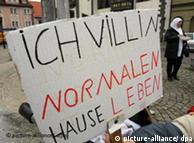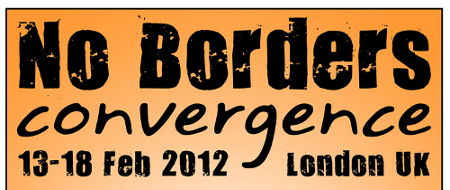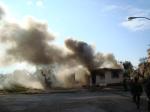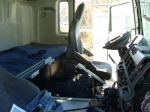پناهجوی ایرانی چرا خودکشی کرد؟
«در اتاق را از تو قفل کرده، پردهها را کشیده و با ملافهای که روی تختش بوده خود را از پنجره حلقآویز کرده است. در اتاق آهنی بوده و بازکردنش توسط نیروهای امداد و پلیس زیاد طول کشیده. میگویند اگر در زودتر باز میشد امکان نجاتش بود».
"محمد رهسپار" ۲۹ سال داشت. گفته میشود از پرسنل نیروی انتظامی بوده، گفته میشود که در ایران مدتی را زندانی و تحت شکنجه بوده است. حتی برخی دوستان نزدیکش ادعا میکنند که براثر شکنجه ناراحتی شدید کلیه پیدا کرده بود.
هفت ماه پیش ایران را ترک کرد و در آلمان تقاضای پناهندگی داد. یک ماه در زیندورف و بعد وورتسبورگ در ایالت بایرن، کمپ "امری کاسرن" که تا آغاز دهه ۹۰ میلادی محل اقامت سربازان آمریکایی بوده میشود محل جدید زندگی محمد. «یک اتاق ۱۲ متری با سه نفر هماتاقی و حمامی با سه دوش که ۳۰ تا ۴۰ نفر ساکن در آن طبقه باید از آن استفاده کنند و چهار دستشویی برای همین تعداد».
اینها را رضا میگوید، رضا تیموریان پناهجوی ایرانی دیگری که از حدود ۱۵ ماه پیش در همین اقامتگاه پناهجویان ساکن است. او ادامه میدهد: «مدل دید به این هایم و به این آدمهایی که اینجا هستند یک مدل به خصوصی است یعنی ما ایزوله هستیم. از شهر حدود ۷ یا ۸ کیلومتر دور هستیم یعنی بین اینجا تا شهر اتوبان است و این مسافت را حتما باید با وسیله نقلیه بروی، اگر بخواهی پیاده بروی خیلی طول میکشد. اینجا سیم خاردارهایی هست که کاملا ما را از بیرون جدا کرده و یک نگهبانی هست که ورود و خروجها را کنترل میکند. یک فضای بازی هست که آسفالت است و احتمالا برای تمرین نیروهای نظامی بوده. اینجا مثل یک پادگان است با ساختمانهای خیلی قدیمی و راهروهای بزرگ ودرهای آهنی سنگینی که به سختی باز میشوند».
رضا از برخورد معدود آدمهایی که پناهجویان با آنها سرو کار دارند میگوید: «مثلا یک اداره پست هست که سه تا چهار ساعت در روز کار می کند و افرادی که در آنجا هستند با لحن خیلی بدی صحبت میکنند و اصلا جواب کسی را که آلمانی بلد نیست نمیدهند و میگویند باید زبان یاد بگیری درحالی که چیزی تحت عنوان کلاس زبان آلمانی اینجا برای ما وجود ندارد».
این پناهجوی ایرانی از کسانی میگوید که معتقدند همه پناهجویان تنها برای گرفتن پول به آلمان آمدهاند و مشکل دیگری جز مسائل مالی ندارند. رضا البته از گروه دیگری هم سخن میگوید، کسانی که در زمان اعتصاب غذای پناهجویان به دلیل اعتراض به کیفیت بد غذا، برای آنان غذای خانگی میآوردهاند.
شرایط بد اقامتگاه، دلیلی برای خودکشی؟
دکتر "آگوست اشتیش"، پزشکی که مسئولیت مراقبتهای پزشکی کمپ وورتسبورگ را بر عهده دارد به خبرگزاری آلمان گفته که شرایط روحی محمد به دلیل زندگی در کمپ از ماهها پیش خوب نبود. به گفتهی وی در ماه دسامبر زمانی که محمد برای معاینه به کلینیک رفته بوده از خودکشی سخن گفته و این پزشک، مسئولان کمپ را مطلع کرده و گفته شرایط زندگی او باید تغییر کند. به همین دلیل مسئولان اقامتگاه به او اجازه میدهند که به دیدار خواهرش در شهر کلن برود. البته رضا میگوید با تقاضای انتقال محمد به شهر کلن، نزد خواهرش به دلیل پیچیدگیهای اداری هنوز موافقت نشده بود.
با همه اینها سخنگوی مطبوعاتی دولت محلی منطقهای که این کمپ در آن قرار دارد گفته: «ما هیچ نشانهمشخصی نداریم که این فرد قبلا در خطر اقدام به خودکشی قرار داشته است».
رضا تیموریان نیز میگوید نشانههایی از افسردگی در این فرد ندیده: «خیلی انسان متین و مثبتی بود، خیلی انسان فعالی بود، ورزشکار بود و در اتاقش وسایل ورزشی خیلی اندکی داشت، سالم بود، سیگار نمی کشید، مشروبات الکلی نمی خورد و دوستانی که با او بودند و در طبقه بالای ما ساکن بودند، یک گروه بودند که با هم خوب بودند. من اصلا نشانههایی از افسردگی در او نمی دیدم اما بعد از مدتی احساس کردم که کمی غریب شده، دوستانشان روایت می کردند که ساعتها پشت پنجره مینشست و میگفت اینجا هم که زندان است».
دکتر اشتیش گفته این تنها مورد خودکشی در کمپهای پناهندگی نبوده. او میگوید: «تعداد زیادی از پناهجویان در اثر زندان و شکنجه در کشور خود دچار آسیب پایدار روانی شدهاند و با این وجود ناچارند در اقامتگاههایی که سابق بر این پادگان بوده سکونت کنند و زندگی گروهی در این گونه مکانها آنها را بیمار میکند». این پزشک همچنین رفتار با پناهجویان در ایالت بایرن را نامناسبتر از سایر نقاط آلمان میداند.
روز واقعه
رضا از روزی میگوید که شب هنگامش محمد خودکشی کرد: «حالش خوب نبود، آمبولانس خبر میکنند و آمبولانس هم او را با زیرشلواری و عرقگیر به بیمارستان میبرد. در بیمارستان هیچکس زبان او را نمیفهمد، محمد یک کلمه هم آلمانی بلد نبود، مترجمی هم حضور نداشته و بنابراین نتوانسته مشکلش را به پزشکان بگوید. در نهایت او را بدون هیچ گونه اقدام پزشکی مرخص میکنند».
او میگوید محمد حتی نمیتوانسته به پرسنل بیمارستان بگوید که پولی برای برگشت ندارد و لباسش هم مناسب رفتن به خیابان نیست در نتیجه با همان لباسها و ظاهرا پیاده در سرمای زمستان به کمپ بر میگردد.
بعد از بازگشت به اتاقش میرود و در را روی خودش قفل میکند و چند ساعت بعد، ساکنان کمپ متوجه میشوند که محمد پاسخی به درزدنهای مکرر نمیدهد. پلیس و نیروهای امداد و در آهنی که قصد باز شدن نداشته و دست آخر، پیکر آویزان از پنجرهای که محمد ساعتها مقابل آن مینشست و میگفت "اینجا هم که زندان است".
رضا، هموطن و همزیست محمد در اقامتگاه پناهندگان وورتسبورگ میگوید: «ما هیچ چیز اضافهای نمیخواهیم، تنها تقاضای ما این است که ما را ببینند و ما را بفهمند و بدانند که ما هم انسانیم و اگر انسانها برابرند ما هم خواستار شرایط برابریم. اگر واقعا یک انسان اروپایی میتواند در این شرایط زندگی کند، ما هم زندگی کنیم و ما هم ادامه بدهیم. اگر نه به ما بگویند چرا؟ به چه گناهی ما باید در این شرایط زندگی کنیم؟».
و پزشک مسئول کمپ ووتسبورگ خطاب به پناهجویان ساکن این اردوگاه میگوید: «خودکشی راه حل نیست»







 London NoBorders, along with Goldsmiths students and other groups, are organising a week-long convergence to be held in London between 13 - 18 February 2012. The aim is to get together to share our knowledge and experiences in relation to people's freedom of movement and the restrictions on it, and to share skills, network, strategise and take action.
London NoBorders, along with Goldsmiths students and other groups, are organising a week-long convergence to be held in London between 13 - 18 February 2012. The aim is to get together to share our knowledge and experiences in relation to people's freedom of movement and the restrictions on it, and to share skills, network, strategise and take action.
